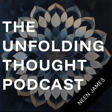Introduction of Ryan Hogan
00:00:02
Speaker
Welcome to the Unfolding Thought Podcast. My name is Eric Kratom. Today's guest, Ryan Hogan, is a Navy officer and entrepreneur whose experience runs the gamut from selling creepy crawlers to founding an apparel company, running zombie-themed obstacle course runs, founding and then exiting a highly successful subscription mystery box business, and and now founding and running Talent Harbor, a company aiming to disrupt traditional recruiting.
00:00:36
Speaker
Ryan's stories and arguments are fascinating and also really relevant for anyone building teams and businesses. So I hope you'll find this conversation just as interesting as I did.
00:00:49
Speaker
And now... I bring you Ryan Hogan. Ryan, thank you for joining me. Would you mind telling me about yourself?
Military and Early Business Ventures
00:00:56
Speaker
Yeah, sure. ah Ryan Hogan. Gosh, ah really kind of two different trajectories. So one of those was with the military joined 17 years old. My mom signed the permission slip, eventually went on to become an air crewman.
00:01:11
Speaker
made it Made a ton of mistakes in the military. and And we can talk all about that. And I think some of it's been kind of relevant to where I am today. But I was one of those kids that was lost.
00:01:24
Speaker
And I needed discipline. um I needed direction. ah just needed to kind of find my way. um But I had a lot of energy, a lot of passion, a lot of my ambition. um and And that's what the military brought me. But it it didn't come easy.
00:01:37
Speaker
ah You know, i I joined to find myself. And and I was not the... Not the best, um but worked my way up over 10 years and eventually got into a program called the Seaman to Admiral Program.
00:01:49
Speaker
Got a commissioning, so I went from flying in the back of helicopters, which was amazing, um except for that number three compressor stall when we started dropping out of the sky, but um everything except for that incident.
00:02:02
Speaker
And then ah became an officer, drove ships for a while. um But there's also been this entrepreneurship journey. And that journey started in third grade in Mrs. Price's class. I used to sell creepy crawlers. So do you remember you remember the Easy Bake Oven for boys? I used to make those insects.
00:02:22
Speaker
that was ah That was it. And so I started selling those for $0.10 if you wanted one. But if you wanted custom colors and I would have to go home, that would be $0.25. Missed price shut us down.
00:02:34
Speaker
But a ah good early life lesson and in finding product market fits, understanding kind of where where demand exists. And it just never stopped. it went from that to mowing lawns, to shoveling snow, to parking cars, to Selling t-shirts to a zombie event called run for your lives, which was basically, if you think back to 2010, 2011, warrior dash, tough mudder, Spartan race, things like that.
00:02:59
Speaker
This was ah five kilometer obstacle course race, except we put 250 zombies on the course that would chase you around. um And they would try to take your the flags off your flag football belt.
00:03:12
Speaker
That grew very, very fast. So I've had probably thousands of ideas out of those ideas. Maybe I got 50 of them out the door. And out of those 50, only three have found maybe four, but really three have found some sort of significant traction.
00:03:26
Speaker
And that was the first one. And it took off and it blew up and that was amazing. But it also just dropped off a cliff. And so, so many lessons learned, um, how to hire, maybe, maybe hire for experience and expertise and, and also hire for culture fit and, and leave your best friends as best friends and see them in other places.
00:03:47
Speaker
Um, and also how to watch a balance sheet and put a ah group of peers around you. So, Took all those lessons learned, launched Hunt a Killer. Hunt a Killer went from zero to 50 million bucks in six years. It was an incredible journey.
00:04:01
Speaker
Crazy ride. We can go into detail on that too. And then today I'm in recruiting. And yeah like the most common question I get is, how did you go from zombie events to a murder mystery experience to recruiting?
00:04:15
Speaker
And that's a, it's not so much of a mystery, but anyhow, that's it. That's it.
Balancing Military and Business
00:04:20
Speaker
That's, that's been the journey over the last 40 years. Ryan, am I assuming correctly that whether it was run for your lives or some other business that you started those after you went maybe into the reserves from the military?
00:04:43
Speaker
That would be the logical thinking there. um No, I would. All of these companies were side hustles. ah And um so the company the company, one of the companies I started was called Warwear, and it was a performance athletic apparel specifically tailored to the war fighters of tomorrow.
00:05:02
Speaker
um Gosh, I needed a lot of help ah marketing back then. But basically, we bought we bought a bunch of shirts. And when I say a bunch, I mean a a a two-car garage full of boxes, shirts, imported from Bangladesh.
00:05:16
Speaker
And that was the first lesson in, if you build it, they don't come. um But at that point, I was stationed at Patuxent River, Maryland. And I was a test and development air crewman on MH-60 Sierra. So basically, the Navy was trying to take all these ah mine countermeasure systems out of the 53, put them into this.
00:05:33
Speaker
This ah smaller platform. And so I was like, oh, well, while I'm here doing this, I'll try and sell some T-shirts. ah That didn't work. And and so that was the first experience. And if you build it, they don't necessarily come, um especially if you're not solving any sort of problem.
00:05:49
Speaker
And so fast forward, I had to figure out a way to sell those shirts. And so ah I saw Warrior Dash and I called up my best friend from ah grade school. And I was like, hey, do you want to start an event together? Because I've got a whole garage full of shirts that I need to move.
00:06:06
Speaker
And basically we can use the event as the vehicle to give these away for free. And that was that was it. But I was still active duty at that point. um I wound up getting picked up for a program called Semen to Amaral, which put me through NROTC program.
00:06:21
Speaker
And that's when Run for Your Lives took off. And then right at the tail end of that entire program, Run for Your Lives died. And then um got a commissioning in the Navy, shipped out to San Diego to drive ships for a few years and then launched Hunt a Killer.
00:06:37
Speaker
And so I was still active duty. And then Hunt a Killer took off, which was great. And then that allowed me to transition to the reserve. So I did 15 years active duty and launched three or four different companies during that time.
00:06:49
Speaker
Actually, probably more, but just three or four that actually got off the ground. and then um And then Hunt a Killer. So now I've been in the reserves for the last eight years. Do you think that there is something that is either unique or less common that seems to have driven you to execute upon these ideas? And I ask that in part because I think that a lot of people that are that think that they are not creative actually are in many ways.
00:07:22
Speaker
We all have ideas all the time. I think one of the things of many that separates people that have an idea, but you know they never sell those t-shirts or even order them or whatever is just that they either don't believe that they can do something or they just don't take any action. Ultimately, I think it's it's that for whatever reason, they don't take any action.
00:07:49
Speaker
You seem to have acted upon a lot of your ideas. So do you think that was, did it come from your parents? did Is it just the way that you're made up or is there something else that's different about you perhaps?
00:08:03
Speaker
Yeah. I, one of the things you just really, that really resonated, you just said, you you said, um, lack of belief in, in a lack of action or lack of taking that first step, a hundred percent agree with you because you have to validate these things for yourself.
00:08:17
Speaker
And like, I never in a million years would have dreamed that, that run for your lives would have taken off and did 8 million bucks. I never in in a million years would have thought that hunt to killer grew to, to $50 million. dollars But it's like once you start validating these things, so like once you get a first order, then a second order, and like you start solving the problems that are right in front of you, you start to believe.
00:08:41
Speaker
And then once you believe and once you've experienced it, you're like, I can do this. I can continue to do this. So even if you were ah but even if you failed, so like, let's be clear, run for your lives failed. I had already validated. i was like, oh, like I am capable. We can do this.
00:08:56
Speaker
I realized that wasn't your question, but 100% agree with you with that. And it's like, you
Childhood Influences on Entrepreneurship
00:09:01
Speaker
have to, you have to just start. And when you start, like, you're going to fail, you're going to fail, and you're going to fail, you're going to fail.
00:09:07
Speaker
And then eventually, you're going to get a hit. And when you get that hit, you just validate a little bit more that like, oh, this is how it works. And it does work. But to the to the upbringing, I was just talking to um a good friend of mine about this a couple weeks ago, and and he was like, hey, what what kind of family? He's also an entrepreneur.
00:09:25
Speaker
And um he was like, what kind of kind of family did you come from? Because my comment to him was, i feel i feel like to a certain extent, i will create chaos in companies. And so it's like sometimes there's like no fires, but then then um I'm an arsonist. So I'll go in and create some fires.
00:09:42
Speaker
And it's to me, it's not happening um intentionally. Like I'm not saying, hey, today I'm going to I'm going to wake up and I'm going to go and create some chaos for the team. And that's that whole EOS, like visionary and integrator thing. And so the integrators is generally kind of that buffer between the visionary.
00:10:00
Speaker
So the visionary can't distract the company too much. and um And I think there' there's two things. Like when I told him about this, he was like, hey, I just read this book and and I forget what book it was. But he was like, and he's very similar to me.
00:10:13
Speaker
And um he was like, what was your upbringing like? And, um, I was like, well, you know, my mom and dad divorced when I was one or two. And he was like, okay, well, how did you, how did your, but what did that look like? Like build me, paint me a picture of this.
00:10:27
Speaker
It's like, oh, well, my mom got fool full custody and my dad would come every other weekend. And he was like, you know, what did that look like? You know, was, was your dad on time? What's that relationship? And and I don't think by any stretch of the imagination that um that like there was a lack of care or there was, there was anything that like, there's nothing that made me feel that there was anything wrong, but there was also to a certain extent, and I don't talk about this too much, but there was,
00:10:58
Speaker
there was disappointment. Like there was times where, where, you know, yeah I'd be waiting for my dad to come and, and he would be 30 minutes late, 45 minutes late, something like that. And, and so there was just this constant, like, to a certain extent, disarray.
00:11:12
Speaker
And like, and, and
Personal Agency and Growth
00:11:15
Speaker
as we were talking about this, he was like, I just read this book. And like, that fits the profile of people that just like, are just going to chase like you're just going to keep going nothing's going to get in your way so anyhow long-winded I don't know the science behind all of this but like I certainly think that there is something to adversity that is experienced early in our days that translates or correlates to our ambition but then we can't explain it so then we never find our why so then all we do for decades is reading books about we need to understand our own purpose because otherwise we're just going to continue to chase
00:11:52
Speaker
I don't know if this is any validation or support for you, but, you know, i have, ah for a time in my career, I worked a lot with organizations, nonprofits specifically, that work in homelessness, poverty, addiction, things like that.
00:12:13
Speaker
And it seems to me maybe universal that many of the people that have challenges in their life of one sort or another now in the space that I was working in, addiction was often a piece of what people were dealing with, but they had plenty of other things that they were dealing with in in you know their own unique sort of recipe.
00:12:39
Speaker
often the people who would have the the the steepest growth, you know, and they would have their own ups and downs afterwards, but, you know, would grow out of the place that they were, the depths of life or the emotional depths or whatever it was that they were in.
00:13:00
Speaker
seem to have recognized that they have agency and that there are a lot of things that happen to you in life, good and bad things.
00:13:11
Speaker
And yet I have a choice about how I feel about the thing or what I do next or what I do six months from now. And I suspect that you are one of these people that you know, despite any of the positives or negatives that came along with plenty of experiences that you've had, you know, not just your upbringing, that one of the things that you learned was I can do something.
00:13:46
Speaker
I'm not just a recipient of or a victim of other people or what life gives me. I agree with that. Here's the other interesting part, because we were talking about this a little bit earlier, this idea of like, you have to, you have to validate it.
00:14:03
Speaker
And like, they're like, to be, to be a hundred percent clear, like I was a entrepreneur for quite some time. Like a entrepreneur is the person that has all the ideas, but what we talked about, like never takes the action on those ideas and never validates to themselves that they're capable of achieving whatever that is.
00:14:21
Speaker
And like that was me for quite some time. And I'm trying to figure out how how I broke through that. But the one of the things is like always putting my back against the wall. And so it's like for me, it's been about micro actions.
00:14:34
Speaker
A micro action would be something like, hey, I have an idea. And most people will just sit on that idea. And I've sat on quite a few ideas. But then if I go to LegalZoom.com, maybe we go get a sponsorship for that. um Go LegalZoom.com and I follow the LLC.
00:14:51
Speaker
Now I'm like, oh, OK, like now I have to move forward. Now I have to do X, Y, Z. And then it's the next step. OK, well, now I need my EIN. OK, well, now I need to put up a website. OK, now I need to do this.
00:15:04
Speaker
And like for me, it's always about setting myself up in a position where I have no choice but to move forward to see whatever it is through. You know, while you were talking, I went to grab this little book off of my shelf here, and it's a printing of a speech called The New Common Denominator of Success by an insurance salesman named Albert E. N. Gray.
00:15:29
Speaker
I'm sure you've heard this,
Critique of Traditional Recruitment
00:15:31
Speaker
a variation of this statement, plenty of other places, but I remember it first sticking with me from this gentleman's speech, and he gave this speech in I think it was the 40s or the 50s.
00:15:42
Speaker
So it I believe he's not around anymore. One of the things that he says is something like, successful people don't want to be told no, and yet they're willing to be told no.
00:15:55
Speaker
And as a result of being willing to be told no, successful people hear no lot more times than unsuccessful people. And that I feel like some of what you said and speaks to that, you know, and you'll have to tell me, of course, as we go through this conversation, if I'm projecting a bit too much, but.
00:16:22
Speaker
I can tell you having freelanced through part of my career, actually for quite a long time, having worked in businesses and now building a couple of different businesses of different types, that it is really easy to get into a mindset of waiting for someone to tell you what to do.
00:16:48
Speaker
or coming up with the idea, or just telling yourself for some reason that it's not worth doing something, taking an action, or taking a chance making an investment.
00:16:59
Speaker
And yet I come back to this speech quite a lot. I recommend if you haven't read it, you can find the new common denominator of success by Albert Ian Gray for free online. You don't have to buy the book.
00:17:13
Speaker
If you haven't read it, I would read it because I find it really inspirational to think that, you know, if something's really worth it to you, you are willing to risk not just money, right? But also that it hurts when people tell you no, or when people tell you that war wear, I think it was, is a bad idea.
00:17:36
Speaker
And I'm sure that it you had some confidence until that idea failed. And then afterwards, it hurt even worse because you had the failure and you didn't have the belief of people around you.
00:17:51
Speaker
Yeah. You know, what's, you know, what's so interesting about that is where, where was the company that's like close friends and family were like, Oh, cool. Like starting a t-shirt brand. That's cool. Like you can do something with that.
00:18:03
Speaker
And that went nowhere. And it was all the other crazy ideas where they were like, that's insane. Like, I'd be like, Hey, I'm going to, I'm going to develop this event where like there's zombies on the course. Be like, no one's going to pay for that. and So that's been one that's been like kind of like a litmus test for me is like if enough people that are close to me are like, hey, that's a great idea. I'm like, this is a terrible idea.
00:18:23
Speaker
So I still get told no all the time. But the beauty of no's is that there's a lesson in every single no. And so like, let's say I've never well, I guess I kind of did door to door sales because when I did the lawn mowing and the um and the snow removal. So we did some door to door.
00:18:40
Speaker
But like, let's say you're a door to door salesperson. And you're just knocking on doors and the owner says no. Understanding like why that person said no will allow you to get less no's in the future.
00:18:53
Speaker
And so it could be something like they don't have a need for whatever that product is. um They're not. So maybe it's not the right window. Maybe they're not your ICP. It's not the right geography, demographic, whatever that may be.
00:19:06
Speaker
There's a variety of reasons, but like the more no's you get, the more you learn. And eventually, like then you start figuring out ways to get around the no's. And so a part of that might
Talent Harbor's Innovative Model
00:19:17
Speaker
be like not going to that same neighborhood, going to the neighborhood across the street.
00:19:22
Speaker
Therefore, like now the no's have reduced. You're still going to get them. But that's that's something in like... It's like work smarter, not harder. And that's something that we do today at Talent Harbor. Like, you know, we don't do a lot of cold calling and cold email, like all that stuff where like, you know, is the person in need for a recruiting agency? Like, is it the right IC? All those different things. Like for us, it's about building meaningful relationships.
00:19:47
Speaker
And like, how do we build those relations? Can we just ask somebody if they want to, you know, go do X, Y, Z? It's like, well, how do we reduce that friction? And just like you, we have a podcast. And so like, instead of just going in immediately with like an ask that doesn't have return, we go in immediately and we say, hey, do you want to come on our show? We would love to have an amazing conversation with you.
00:20:05
Speaker
So anyhow, I loved what you said there. And it's like, you got to get the no's. You got to go through, like, you got to go through the trenches. But the whole idea is that, like, you don't go through your entire life um getting no's because you're figuring out how to get the yeses.
00:20:20
Speaker
Yeah, I totally agree with you. And there are a lot of things that I want to ask you about your journey and about some of the, you know, businesses that you've mentioned.
00:20:35
Speaker
However, i feel like you are in the recruiting space now and that for me in particular, I'm very interested in not just what you're doing, but also your ideas about the future because of all of the economic uncertainty that we have going on and AI, automation, robotics, and so on.
00:20:58
Speaker
So I guess I'm going to put it like this. So you founded Talent Harbor, as I understand it, with sort of a different model from what we traditionally see in recruiting.
00:21:12
Speaker
So, Ryan, what's your beef with the standard recruiting model? My beef with the industry is twofold. And so one, we'll talk about business model, and two, we can talk a little bit about process.
00:21:23
Speaker
But from a business model standpoint, somewhere, I think it was like the nineteen fifty s Somebody started placing people, which meant like people were coming back from the world wars and they were like, I'll take, I'll make this introduction with this soldier to this company over here. Okay. They got a job. Let me go to this company and ask them for 30%.
00:21:43
Speaker
thirty percent Where did that come from? just came from my head. 30% commission for their first year salaries. What, Why that has not changed over the last 70 to 80 years, I have no idea. So my first beef is that there's this business model that has never been challenged and everybody just believes that recruiting is worth 30% of first year compensation. Can you negotiate it? Sure. So maybe you can get it down to 25%. If it's a and a shop that's willing to go even lower, maybe 20%. But the fact that hiring somebody cost-
00:22:17
Speaker
$25,000. I mean, we spent about a million dollars at, at Hunt a Killer on recruiting. The fact that like, that's a thing made zero sense to me. So my first beef is like, there's been zero innovative thinking.
00:22:28
Speaker
And if you ask a recruiter, why are your services worth 30%? Maybe they'll get into quality, but the reality is that's the way it was. And that's that's what they're doing. And that's just been the model.
00:22:42
Speaker
Think about technologies, innovation, databases. Like 30% was when humans to humans were making in-person connection. And then we had filing cabinets and fax machines and all these different things.
00:22:53
Speaker
And so you had an actual like, you know, you had to go deep into a niche because you had to have a ah ah database of sorts of people that you could pull from. What do we have today?
00:23:05
Speaker
a billion people online that are in some sort of database that we can pick from. Put a layer of AI over top of that. And like now you can you can decipher between who's who and curate that list. So anyhow, my first beef is that we're using an archaic business model and there's zero self-awareness with recruiters on this because they just think that they deserve it.
00:23:25
Speaker
I'm like the anti-recruiter recruiter. And probably based upon the conversations you've derived, I'm not a recruiter. um i just find incredible, brilliant people to partner with that can help with um these things. I was not a game designer. I was not an obstacle course designer. We went out and we found people that could help with these areas.
00:23:43
Speaker
And then the second thing with recruiters beyond the the lack of self-awareness is their process. Like when you bring a contingent recruiter through and it's all about 30% commission or success fees, then they, you are actually being sold to at that point because all they want you to do is hire that candidate because they don't get paid until you hire the candidates that they're putting.
00:24:09
Speaker
There are so many times that I've worked with recruiters. We worked with about seven different shops. So many times we worked with recruiters in the past. And I felt like, obviously, we had the ultimate decision.
00:24:20
Speaker
But I felt like the recruiter was like advocating on behalf of the candidates instead of the behalf of us. Here's a dirty secret. Recruiters prep the candidates before they ever start interviewing.
00:24:33
Speaker
But a business owner, why would I want someone that's prepped? Do I want them to understand the business? Yes. Do I want them to be motivated to come and speak to me? Yes. Do I want them to know all the dirty secrets and questions I'm about to ask?
00:24:45
Speaker
No. like that You're not getting an accurate reflection of who that who that human is. And so just some of these tactics and some of these misaligned incentives, it really turned me off, which is why I got into this.
00:24:57
Speaker
And with Talent Harbor, then... think you implied this, but maybe did not say it. You have a retainer or something like that.
00:25:12
Speaker
So there's no success fee. It's a standard rate or hourly or something of that nature. And then it sounds like you also may have a different engagement with candidates.
00:25:25
Speaker
Yeah, so we call it recruiting as a service, which is basically like we took the playbook right from Hunt a Killer. Hunt a Killer was a subscription box before before the retail distribution. And we took ah we took the playbook from that and just said, hey, listen, it's a flat monthly fee.
00:25:41
Speaker
You stay as long as you need us. um For us, the average time to hire is about 48 days, which means most clients stay for about two months active. If they don't have another role, they'll turn it on Paul's.
00:25:51
Speaker
A few months later, they'll have another another um requirement. They'll come back and they'll turn it on. But that's the whole premise is that it's recruiting as a service. So it's a flat monthly rate, no contracts, no success fees, no bullshit, just like just a simple model that aligns incentives. Now, there there is the whole, well, maybe you just take longer.
00:26:13
Speaker
if If that's the case, then you would cancel your services and you would never come back. like we are Because of our model, we're actually incentivized to do incredible service because in order to extend lifetime value and have repeats and returning clients, we have to do good work but within that first month or two. So long-winded, that's the model and that's that's how we kind of see it. And then when we think about the process, there are...
00:26:41
Speaker
There are two things that recruiters are trying to do as you're qualifying candidates. The first is you're trying to predict future performance, and that's based upon what have they accomplished in the past, um what drives them, what motivates them, um ah the different things that that are going to make them successful in that role.
00:27:02
Speaker
Then there's the second part, and you're trying to predict their future behaviors. And that's their actions. That's their values. That's the construct that says, this is why I made the decision that I made.
00:27:14
Speaker
And that's not going to determine their sex and success in the role. That determines their success inside of the organization. And so when I've gotten hiring wrong in the past, it's not because I couldn't read a resume. It's not because I couldn't say, oh, well, this person has the relevant experience and they said all the right things.
00:27:31
Speaker
It's because I brought people into my organizations that did not did did not align with the core values of the company. um And that's what so many, like, I would say 90% of the time companies miss that because,
00:27:46
Speaker
Most companies, especially small, medium size, like recruiting is not a core competency for them. And recruiting is a core competency, just like you have an operations and you've got all these different systems and processes.
00:27:57
Speaker
If you don't have that built out for recruiting, your odds of getting it wrong are incredibly high. And then recruiters in general, like they're very, very rarely are they asking specific behavioral questions.
00:28:09
Speaker
Very rarely are they understanding the company and diving deep into the core values and then being able to translate that into does this candidate fit into my organization?
Hiring for Cultural Fit
00:28:19
Speaker
There are thousands, thousands of recruiting shops and and you get a lot of like recruiting shops that are like one person or maybe one person then and an executive assistant.
00:28:30
Speaker
And it's a very fragmented and a majority of the recruiters out there in my experience, like my experience, onboarding recruiting shops, using recruiting shops throughout all of my businesses. I've probably used a dozen of them.
00:28:44
Speaker
In my experience, most of them are terrible. And The problem is, is because of that and because it's a commodity, like you have to come in with some sort of unique thing. And so like the ah problem, the problem we have as an organization is we're kind of competing for price.
00:29:01
Speaker
ah We're competing on price. And so when you say, when you say like, you know, the 30%, a 30% commission, let's just take ah and a salesperson with an ott OTE of $60,000. And let's say that's some sort of like SDR role for a software company.
00:29:19
Speaker
That's $60,000. One human. Go find one human. That is $60,000. For us, we're $5,000 a month. We're placing in two months. That's $10,000. And usually when people are using us, they're hiring more than one role at a time. So think 60 times three, that's $180,000.
00:29:35
Speaker
For us, it took us three months to do that. That's $15,000. And like, weirdly, we're competing on price. And we're trying to figure out how not to compete on price because the The brutal truth here is we are best in the world at this.
00:29:48
Speaker
But the only way that we can get our foot in the door and kind of get around the clutter is by saying like, hey, our business model aligns. Like we are incentivized to do great work because you will turn us off, spend $5,000. That's the risk, right? They spend $5,000 and it was terrible.
00:30:03
Speaker
We have not had that happen yet. So to get our foot in the door, we go in through the sales core function of an organization. And then we do, um we compete on the business model. Once we're through the door, we stay because we do incredible work. But like we've been really thinking through like, you know, is there is there a better way? Is there more that we can offer? Because like recruiting is a commodity and like, you know, we don't want to compete on price. We just think the business models of the 50s are stupid.
00:30:32
Speaker
It sure seems to me like when you talk about understanding the company's values and their culture, and I think then it becomes implied in what you're saying that if Talent Harbor does not bring on the right person for you, you're going to be replacing them in six or 12 months, which is another, and the standard model, 30%.
00:30:57
Speaker
thirty percent When people hire the wrong person, what... Typically a business owner, especially small, medium-sized business owners, and this was me, like I would say how much money came from my bank account, mine as in the company's, how much money came from the company's bank account and went into their salary or benefits?
00:31:16
Speaker
So let's say it's a $200,000 hire. They worked there for six months before ultimately made the decision. That's $100,000. You'd be like, oh, that wasn't bad. It was just $100,000. That's
00:31:29
Speaker
No, it was absolutely not just $100,000. You have to think about the time that you spent to recruit that person. You have to think about the money that you spent to recruit that person, the the heartache, the um the opportunity costs, everything along with that, and the degradation to culture.
00:31:46
Speaker
and And at the peak of Hunt a Killer, we were about 150 employees and we had we had some issues. um We had some um wrong hires. We had some EOS likes to call it right person, right seat.
00:32:00
Speaker
We had some wrong person, right seat scenarios, which meant they were incredible at what they did. They just weren't a good fit for what we were trying to build, you know, as a as a company culture standpoint.
00:32:13
Speaker
And that infected the entire organization because it goes from one or two individuals to their team. It goes from that team to that department. Then it goes from that department and starts infecting the other departments.
00:32:25
Speaker
You start to think about like the degradation to culture. You start to think about the organizations that they made or the decisions that they made for their team and the actions that they took and the things that you didn't do that you should have done or the things that you would have done if you would have hired the right person.
00:32:41
Speaker
You take all of that and like now you're million bucks easy into that and maybe even like a ah weird trajectory of you would have been on a completely different level. And then, oh, by the way, you've got to redo the search.
00:32:52
Speaker
And when somebody's doing a search, it's never because they have too much capacity. Right. So how many companies out there, you know, everybody's operating at 50 percent capacity and someone goes, hey, we need to go hire someone that that never, ever happens when when hires start happening is because people are already at 100 percent, maybe even more.
00:33:13
Speaker
They're they're working 10 hour days. And so when they start hiring people, It's a it becomes this like collateral duty. So it now stacks on top of their day to day, their kind of special big projects. And now they've got this new thing where they know that they need to go find the right person and they feel all this excruciating pain, but they don't know how to prioritize things because work still has to get done.
00:33:38
Speaker
What are some of the experiences that you've had or some of the things that you went through that, in addition to working with recruiters, of course, you feel like trained you or educated you about these things that you're saying are highly important?
00:33:56
Speaker
Culture being one example. ah Just doing it wrong. I mean, the the battle scars from like hiring the wrong people and and not understanding our culture. Like when when ah a CEO, there's not many jobs for for a CEO. Now in a startup, it's every job because CEO is wearing every hat. But once you get to a place of where you've got a ah good job,
00:34:20
Speaker
senior leadership team in place, like there aren't many jobs. They are the most impactful jobs across the entire organization, but there's not many of
Military Influence on Business Practices
00:34:29
Speaker
them. And it's like culture is the number one.
00:34:33
Speaker
and And being able to be intentional about what you're putting together and drive that culture forward, because the minute that it goes, the minute that it slips, like think of something. There's always this example of like, you know, you walk you walk by a piece of trash on the ground. Do you pick it up or do you just step right over it?
00:34:49
Speaker
And it's like the minute that you you make the decision to step right over it and someone across the the warehouse sees what you just did, like, now that person steps over it.
00:35:00
Speaker
Now that person steps over And it creates this thing. And so to not be intentional about creating a culture, the whole thing can go to the wayside. So, you know, for me, it's about the lessons that I learned, even through even through Hunt a Killer. Like, you know, from the outside looking in it looked incredible.
00:35:18
Speaker
like number six on the ink list. And we raised a whole bunch of money and but internally like problem after pro and consumer product, by the way, is like one of the hardest verticals to, to cause it's like just yeah consumer demand opinion. Like everything's changing constantly. You're trying to stay ahead of like curves and all these other and trends. It's, it can get wild.
00:35:42
Speaker
But like our culture at Hunt a Killer was constantly tested and it was tested to the degree of like, oh, we've got another inferno burning this week. Like, are we going to step up to the plate and and figure it out or, you know, are we not?
00:35:58
Speaker
So anyhow, yeah, I think the easiest thing is like. Why do I know these things to be true? because i Because I lived it, because I made all of those mistakes.
00:36:08
Speaker
It doesn't mean I know how to fix them. It means I went out and found the person that knows how to to do these things better. um And now she's doing it for other companies, which is great. I forget where I encountered it, but you know with you being in the military, I'm sure you've heard plenty of these things and perhaps thought to yourself, that's a story about the military? I never heard that.
00:36:32
Speaker
you know So I was reading some book, and I don't recall if this person had been in the military or not, but they were... saying in the military, you know, let's just be very general here.
00:36:47
Speaker
In the military, there's this idea that if you have a standard and you don't uphold it, you've now set a new standard. And I thought your example of, you know, there's a piece of garbage or whatever it is, and you just step right over it or walk by it is a really great sort of visual of that because the standard on paper Or yeah in a warehouse, the rules that we follow, safety regulations, might very well just be up on the wall and they say something and we don't uphold that thing.
00:37:23
Speaker
Now the standard is reset regardless of what is up there on the wall. So you... might very well have never encountered that exact thing because I have never been in the military.
00:37:37
Speaker
And, you know, there are plenty of these business books or thinkers like ah Simon Sinek or someone like that that will say in the military, it's like this. And then you're thinking it wasn't like that for me.
00:37:49
Speaker
No, I've got a list and I've been keeping this list ever since I... So I was in E1 twice, um which meant I made E2 and then got into a little bit of trouble and and went back down to E1.
00:38:01
Speaker
And since I've been in I have been taking notes on... what not to do. And like, and there are great leaders in, in the Navy. There are are impeccable leaders in the military, but they're not all great.
00:38:18
Speaker
Like everybody's human. And, um, and like, it's the wall of averages and not everybody is great. and And I took a lot of notes of like what not to do. And it was consistently,
00:38:29
Speaker
those leaders that would say something, put out in guidance, but tolerate less, right? Like there's, there's an X when I was in E1, I didn't do everything right. Or let's just use a different rank. i don't know. E3, like, like I didn't do but everything right. Maybe I would have stepped over that trash.
00:38:46
Speaker
But it's about the leaders, right? Like if I stepped over that trash and a leader looked right at me and didn't say anything, I would say that's now acceptable. If I saw a leader do something like that, and I would say that's now acceptable.
00:39:00
Speaker
And so like the leader set the standard. But to like Simon's next point, you know, what is it? Leaders eat last. Like that's not ah in the army. That's an amazing thing. In the Navy, in the Navy, we have wardrooms and we all go into these wardrooms and and ah people bring us food. And it kind it's a really weird, a weird thing. We we haven't bridged that gap yet Tradition, I guess.
00:39:23
Speaker
But, yeah, I I agree with that. And it's like it's the it's what the leaders uphold and what they allow. Are there things from your military experience that have been useful in your businesses and, I suppose, are there are things from your military experience that you feel civilians don't understand or maybe overlook?
00:39:49
Speaker
Yeah. I'm not sure civilians really understand what it is we do. Just look at that like public discourse of like everything that's been going on over last several years. I'm not sure there's a ah a great understanding.
00:40:00
Speaker
I was a hard head in so many different aspects. Like one of the reasons that I i got into entrepreneurship was because I didn't want a boss, right? Like um there's a certain there's a certain part of me that that like I need a feeling of accomplishment. And so like give me give me a task, give me a duty, give me an order and like I will go kill it.
00:40:21
Speaker
maybe that's like 15% of the time. i really want that. The other 85% of the time, i just need you out of my way. So like, I can get this, whatever this is done. And and I've got my own ideas on and how to do it. and And my ideas are better than yours. I'm not saying they really are, but like, especially as a, as a young person, like that's how I would think.
00:40:38
Speaker
and so, Run for your lives was the first real like, holy crap, like we have a company right now Holy crap. Like we have, we have teammates, we have employees now. Like this is, this is crazy. So everything I did, one, I wanted to stay off of that do not list. So all of those notes that I had taken for 10 years leading up to that, I wanted to make sure that I avoid them.
00:41:00
Speaker
Things like don't say be on time, but be late. So, so like when we say, We're going to be accountable and we're going on time. And we didn't run it like the military, but like being on time was an important thing. And I still think, I still think that that is, but everything else we did opposite, like core values in the Navy, it's honor, courage, commitment. I was like, why does the Navy have these things? Like that doesn't like, yes, we repeat them. Yes, we do these things, but i don't think it's that important. So we didn't have that like hierarchy. I was like, we don't need hierarchy. Everybody will just run a flat organization. So there were some things I was really hard headed over.
00:41:32
Speaker
And then like when you start getting, when things don't start going right, you start to understand like, oh, that's why, that's why those things are the way they are. That's why this is this.
00:41:43
Speaker
Like even from a retention standpoint, you know, the, the Navy from a, when, when they promote or when you're eligible from E1 all the way through, call it like 05.
00:41:54
Speaker
Like everything is strategic in nature. When those bonuses come, when the training comes, um when those commitment comes, hey, I want to go to college. Great. We'll pay for your college, but you're going to owe us three years in exchange for us paying for your college.
00:42:07
Speaker
Like everything is mapped out and it's been mapped out over the last hundred years of trial and error. Is everything they do correct? Is is it? You know, is um is all of the policy and process in there appropriate? No, that's not.
00:42:19
Speaker
But like at the highest level, i was trying to run away from those things because I was like, that's government, that's bureaucracy. And at the end of the day, there is a ton. um So usually I would answer this question with things like grit and tenacity, like what things have I taken from the military? I've taken this winning attitude of never giving up.
00:42:38
Speaker
But like, i I actually didn't like, that's always been inside me. Maybe the military activated, but that's like what I've discovered about myself is that like, that was that childhood stuff of like, not going to give up.
00:42:50
Speaker
And so when you set that aside and say like, well, what other things did, did we carry over? It's a lot of things that I felt didn't belong and, and are just like the core of, uh, of an organization.
00:43:06
Speaker
When you realized you were running a business or not necessarily running a business, that you had a business in Run For Your Lives or maybe Hunt A Killer, depending on when it came, how long was it before you started to question some of that, what I'm going to call contrarianism, perhaps, some of that lack of valuing the standards and, you know, even stating it like this is making me think of that phrase.
00:43:42
Speaker
When the student is ready, the master appears or something yeah like that. Right. Like how long do you think it was before you started to go, Oh, maybe there is something to honor courage, commitment,
00:43:57
Speaker
Yeah. Yeah. And to be clear, mostly because I'm still in the Navy, I have always believed in honor, courage, commitment. I just didn't understand how impactful that type of stuff was in laying the foundation.
00:44:10
Speaker
And ah this gets back to like just being a hardhead. There wasn't like some... like just natural thing that happened where I was like, oh, the Navy was right about this. Okay, it was right.
00:44:23
Speaker
I have to experience it. And so how did I learn it? I learned it through failure. And then I learned it through retrospection. And that's what's crazy is like, it was already there. All of this stuff was like already there, but I chose to ignore it.
00:44:38
Speaker
did what we did. and it failed. And then as I started retrospection on the failure, why did this happen? Why did this happen? I don't understand this. Then I started to draw the lines to all of the things out of, um, out of the military. So, I mean, it's just, it's wild to me that, that like, I'm the type of person you'd be like, Hey, that, that pot's hot. And I'd be like, yep, it is. Ouch.
00:45:01
Speaker
And that's just how I'd been. i would rather, I would rather just act. I would rather just do and figure things out along the way than like do a whole bunch of research or a whole bunch of thinking because I can learn very quick as we go through. So yeah, that was, that was it.
00:45:18
Speaker
It took failure, brutal failure, but it changed everything. So like the first thing, like, you know, made the correlations, made the connections, failure that sucked, came back.
00:45:29
Speaker
As soon as Hunt the Killer started to take off, first two things we did.
Core Values in Business
00:45:32
Speaker
One, we got an amazing person that was good in accounting. Two, I joined a Vistage group. So i immediately had ah a group of peers around me that could help me solve problems.
00:45:40
Speaker
Not too far later, we did um we implemented EOS. And then like we started hiring the right people, not all of our best friends. And like that's how we took a $0 to $8 million dollar company into bankruptcy and then had another company from $0 to $50 million dollars with an exit.
00:45:58
Speaker
You know, one definition of culture is that it's a process of social learning. So social learning basically meaning that you learn something through a group and it May seem rather obvious, but just to make it explicit, I suppose, some of what is culture, what shows up in culture, regardless of whether it's music or art or habits or stories that we pass on, was
00:46:34
Speaker
it resulted often from one person or a group of people learning, when I do this, when I touch the hot pot, I burn my hand. And so we then tell our children and we tell our children's friends, don't touch the pot, a hot pot, because you will burn your hand. And then over time, even though I realized that this likely seems like a stupid example, it just gets to a point where no one that you know has ever touched a hot pot and doesn't actually know through experience that you will burn your hand. It's just, you just don't touch a hot pot.
00:47:17
Speaker
And I, There are two things that I'm thinking about at the moment. One is, you know, when you went and started your own businesses and there was some of problems you know, I'm going to do things a different way, that it's easier to forget some of those cultural lessons, you know, those cultural standards, because you're no longer in that same group, you know? And I wonder if
00:47:53
Speaker
had you been able to do Run For Your Lives as a project within the military, which I realize seems absurd, but let's just pretend that some of the constraints that you would have had on you might very well have turned out to be positive because you never got to test the cultural standards, but you never had to learn the hard lessons either, which there's value in learning those lessons, of course.
00:48:25
Speaker
And the second thing that I'm thinking about, in addition to, you know, you kind of stepping outside of the culture and then having to learn some lessons again, second thing that I'm thinking about is as it relates to talent harbor or just hiring generally.
00:48:42
Speaker
I mean, we don't want to have people generally that are the exact same as everyone else. You know, in recent years, we've had plenty of discussion about diversity in any number of things, and we can define those or talk about them in any number of ways.
00:48:57
Speaker
But just in a very simple manner, you know, there's a lot of value to different perspectives and different types of people and so on. and And that also brings challenges because if we're not aligned around our values and our some of our modes of behavior and our vision of the future,
00:49:22
Speaker
then Ryan, you hire someone for my business. You have no concern whatsoever for cultural fit. And they bring in with them the inability to learn from our past lessons because they don't fit in that culture.
00:49:44
Speaker
So that brings me around to the doubling down on the importance of hiring for culture because why have an individual and our group yet again learn the same lesson over again? Why not pass it down because the person fits in and can learn from us?
00:50:04
Speaker
Yeah. there's um ah One of the things that you said that that really stood out there And it what's really interesting about about the assessment or or or the path you took this down with the, like, you don't want everybody the same.
00:50:21
Speaker
And one of the questions that we have consistently got up or got or received, and we actually just did a workshop a couple of days ago and it was the first question. And Alana, my co-founder, laughed and she was like, I just got this question last week.
00:50:33
Speaker
And it's like, if you're hiring for core behaviors, how do you not hire all of the same people? If you're hiring for core values, how how do you not hire all the same people? And I think what's important is like what you keyed in on.
00:50:46
Speaker
Diversity is in incredibly important. You want diverse perspectives, diverse experience, diversity of thinking, diversity of upbringing, diversity like however, however you want to chop diversity.
00:50:59
Speaker
Organizations need diversity because you need everybody, everybody looking at the same problem, but you need people coming from different angles. And that's how you're going to get the best solution. When you hire people for your core values, it doesn't mean that you're hiring a whole bunch of people that think the same way um or that that decide the same way.
00:51:22
Speaker
Core values are something that that are broad enough to open the aperture to get that diversity inside the organization without saying like, hey, everybody's going to come to the same conclusion on this because they've got the same perspective.
00:51:36
Speaker
And so for for us, like even even at Talent Harbor, like our number one core value is GoGivers. So there there's a book called GoGivers. It's one of our favorite books. There's a funny story of like Alana posted about the book and he also reached out to her and she was like, hey, can we chat? And he was like, yeah, here's my cell phone number, like just wild stuff.
00:51:53
Speaker
But he is, his book is awesome. And it's this philosophy of like, stop, not stop caring about money, but stop doing things in anticipation for some sort of return. Like don't do things because you think that it's going to result in something. Just do good things to do good things.
00:52:15
Speaker
And I promise you, I, as the author of this book, promise you that if you just do good things in this world, good things will happen to you. And like, we embrace that wholeheartedly. And that's our number one core, not that they should be numbered, but like, that's our, that's one of our core values.
00:52:32
Speaker
And that doesn't, that doesn't say anything about like, you know, was this person from here or come from there or, or and anything like that. It just means like people need to come to our organization with a servant first attitude and that's it.
00:52:46
Speaker
Um, we just opened the app store make sure we've got, we've got diversity of thought in there. I think that when we talk about values, one of the important things for people to remember is that there are many largely universal values.
00:53:05
Speaker
Now, I say largely because we can't always prioritize
00:53:12
Speaker
10 values. you know We might be able to prioritize three or four or some number that rarely come into conflict, but there will be times when you value something of the nature of always tell the truth and you also value being quick to make a decision, perhaps, or I don't know what exactly.
00:53:38
Speaker
And yet something comes up, it puts those two values in conflict. And so while many of us hopefully value truth and integrity and courage and honor and commitment and so on, I think one thing that we should generally be doing in our organizations is saying, if we can only hold ourselves true to these three values or these so five values, whatever the number is, we will place these above just about any other value. That's not to say that there aren't values that you yourself prioritize or that we try to hold ourselves to.
00:54:21
Speaker
It's just that we will sacrifice other things in the service of this. And so you can bring someone in that values plenty of other things, but they either because of their constitution, you know, say, i also value honor, courage, and commitment above pretty much everything else.
00:54:47
Speaker
Or i can come to be a person that places these above everything else. Yep. i The other thing, like honor, courage, commitment, only three.
00:55:01
Speaker
That was another thing, like hardheaded thing. Like when i when I looked at that, I was like, i was like the maybe's got it wrong. You know, we're going to have 10. ten And hot or Run For Your Lives had 10 core values. And if I went to anybody in that organization been like, hey, what what's the number seven or core values? You'd be like I don't know.
00:55:16
Speaker
Like less is more when it comes to core values. I think the Navy and the military like nailed it on these things. And and that's something that we like we have for them today at at Talent Harbor.
00:55:28
Speaker
And the the other thing is like core core values should not be easy and that. if If your core values are never tested, then they're probably not core values at all.
00:55:39
Speaker
um And like, i'll I'll give you an example. Like one of our things is do the right thing. And when we are looking at decisions and when we are looking at things that are happening inside of the organization, like we're questioning constantly, like, is this the right thing?
00:55:53
Speaker
And an example would be um we had a client at the end of last year, so we only charge per role. So let's say somebody is is hiring five salespeople. If it's all the same job description, but we don't charge you any more than the base rate. Like you hire as many people as you want. We'll just keep sending them your way.
00:56:11
Speaker
And we had one client that came to us and we had him on two jobs. So there was a call it like a marketing manager job and some sort of sales job. And we had filled one of the roles.
00:56:22
Speaker
Great. We were celebrating. And they said, hey, we want to swap this role out for this. And we brought that internally. And we looked at both job descriptions. And like, we had a lot of conversation, but we were like, these are too close. Like, this is too close to call.
00:56:38
Speaker
Like, what would the right thing be? The right thing would be telling the client, hey, these aren't two roles. These are actually one. So we're going to save you a few bucks. But like, Those are the conversations. Everything that you do, to you should be bringing in your core values to make sure that you're you're living by them. And by the way, like think if think we didn't have that conversation, we would have kept charging them.
00:57:00
Speaker
And then think if somebody else, if one of our lead recruiters inside the organization is doing these and they're like, I'm doing the same search for both of those. And then they go look at that person's account and realize they're getting charged for two roles.
00:57:13
Speaker
What's that person thinking now? Are they like, well, we're just taking advantage of the client because I'm doing the recruiting. It's the same role or they're close enough to where like it won't spread me across two different searches.
00:57:26
Speaker
That's, that's where all of this stuff, that's where it matters. Yeah, I agree with you. And personally, I also like values that are both open to interpretation so that when someone interprets them in a different way, then we generally believe they should be interpreted. We're able to say, hopefully, i understand why you made that decision.
00:57:54
Speaker
However, you know here is the way that we try to behave. So there's an ability to say, You're a thinking person, you know, and you thought you were holding yourself to these values.
00:58:07
Speaker
Let's now talk about how they show up in the world. And, and then that's really the the second aspect is even though i personally value having a value that is open to interpretation.
00:58:21
Speaker
I think one thing that a lot of organizations don't do, and it's not just with values, it's also like goals and vision for the future and any number of things. And they don't take the time to say things like, well, how does this show up in the world?
00:58:37
Speaker
And as a result, you often get into places where somebody says, oh, yeah, I value truth. I totally value truth. And they just interpret it in their own way.
00:58:50
Speaker
And they do something that we think violates the value. And then we point fingers at one another. The company says, i don't value truth. I say the company doesn't value truth. When we could have just taken the time to say, what does this look like in that situation that you're saying? You know, what does it look like for us to do the right thing?
00:59:12
Speaker
And there there are three components to a core value, and then there's constant reinforcement. So when you look at a core value, you should have three things inside of your organization.
00:59:23
Speaker
The actual core value, so it's like a very, very, very short phrase or like two words or three words, but something very short. The second component of record value is an actual definition, like write out two to three, maybe four sentences really explaining what this core value is.
00:59:41
Speaker
And then the third component is a bid and yet. Think back to somebody in the organization that has done this action and write what they did and why it fell in line with this action.
00:59:53
Speaker
So once you have those core components of, of your, of a core value of, of your core values, then it's constant reinforcement. There were times that at hunt to killer where it was like, people are like, are we in a cult?
01:00:06
Speaker
ah Because every Friday we would jump on the line and, and we would, We wouldn't pound our desk, but we would be like, all right, what are our five core values? And people would shout them out. And then we'd go real quick and we'd say, great, we're going to focus on this one today. um And we'd spend three minutes real quick. Hey, this is the core value. This is the the vignette, blah, blah, blah.
01:00:25
Speaker
Then we would do shout outs. And shout outs were managers and and leaders inside the organization would give me their, um um give me a quick description of who and what they did and which core value that was.
01:00:39
Speaker
And I would announce it to everybody and I would say, hey, you know, John Smith this week, um ah this was ah do the right thing. You know, he made this decision, took this action. Hey, he's getting a $20 gift card or or something like that.
01:00:52
Speaker
It's not about the gift card. It's not about it what it's about is continuing to talk about like this is how this organization behaves because when we behave like this, we win.
01:01:04
Speaker
And at the end of the day, like, that's what we want to do. And what we're trying to document are the core behaviors of the organization that lead to that winning.
Growth and Future of Talent Harbor
01:01:13
Speaker
There's no right or wrong here. Like, if you went and worked at Tesla or X, and then you went and worked at Zappos, like, two completely different calls.
01:01:25
Speaker
One's like, you know, kind of hippity-dippity and like... but whatever, and they'll pay you to leave. But like, you just got to be focused on these things. and it's very fun.
01:01:35
Speaker
The other is hardcore. Like you're going to come in, you're going to work X amount of hours a week. And like, there's not going to be a lot of resources and we're going to beat you down. Those are completely opposites. One's not right. One's not wrong. Both are obviously leading to success.
01:01:49
Speaker
And so just being able to define that, articulate that and reinforce that daily um is critically important. you know You talked about some of the things that you're trying to address with Talent Harbor around the business model and serving your clients well.
01:02:08
Speaker
You also talked a little bit about some of the challenges that you face, you know helping your potential clients understand the value of your model or that you're able to do the job and Where are you in the development of this business at the moment?
01:02:28
Speaker
Well, we figured out the model. We've got a we got a proven process in place. We've been doing this for last year and a half. Alana's been a recruiter for 25 years. Basically, like my whole philosophy and in business, well, one is that businesses are just vehicles. So a question I get all the time is like, well, is recruiting really fun? You came from this relationship.
01:02:46
Speaker
sexy business and, you know, murder mysteries you get into recruiting. It doesn't matter me. Like, it doesn't matter whether it like that doesn't, that's not what motivates me. What, what inspires, what it motivates is bringing brilliant people around solving hard problems.
01:03:01
Speaker
And what I identified in the recruiting industry was a really tough problem because it's been around for 70, 80 years. And like, nobody's, nobody's had enough self-awareness to say, Hey, like, should something change around here?
01:03:14
Speaker
And so that's ah that's that's been important. So where are we today? We are growing incredibly fast. um I think we really kind of found product market fit. And we're just kind of like we're having fun. We're doing great work.
01:03:28
Speaker
we've taken We've taken the the proven process. We've documented it. We train all of our tenured recruiters to the proven process so we can do the same consistent quality work across the board.
01:03:40
Speaker
we're just kind of having fun and and growing it. And like, I think I was talking earlier about this, just in full transparency, like we're so damn good that that clients only stay for about two months before they have their next role. And so we're trying to figure out like, what other services can we like? Like we've mastered this, we're doing good, but like it's a leaky bucket, meaning clients don't have to stay very long and and it's gonna, there's probably something else we can do. And so we're trying to figure out like,
01:04:07
Speaker
what can we bundle all together to solve like maybe even a broader issue that's like recruiting plus training plus onboarding plus but whatever the case is, um and kind of bundle those things and, and have a more kind of longer, longer term, uh,
01:04:27
Speaker
engagement. Hey, you know, a year and a half, as you well know, depending on where you start financially, perhaps, or whether you raise funding or who knows what, there are stresses with not just running a business, but starting a business.
01:04:48
Speaker
And For all I know, you might very well say, we're still kind of starting it. Or maybe you say, no, the startup phase was the first eight months, who knows what. But there are stresses all along the way. And it sounds to me like some of the worries that you might have gotten off of your plate at this point are things like,
01:05:16
Speaker
can I even get this business off the ground? And you're there. So I congratulate you. You mentioned having a podcast and we've mentioned Talent Harbor already. So i suppose, one, can you tell us about the podcast? Two, where should people go to find you or connect with you?
01:05:37
Speaker
Yeah. Yeah. So I've, I've got a podcast called confessions of an EOS implementer. I started drinking, they call it the orange Kool-Aid. Some implementers love it. Some are like, we can't, we can't keep saying that, but it is and amazing EOS changed my life.
01:05:53
Speaker
EOS was one of those things where, where like the business was running me, I wasn't running the business. And it's like simple stuff, by the way, like it's stuff that's been out in the universe forever. They put spins on certain things and they, they trademark certain things, but these are all things that existed. The brilliance behind what Gino did and traction and EOS was they brought all those things together, simple, easy to understand.
01:06:17
Speaker
Now, implementation is challenging. Um, Uh, because like consistency and working at it every day, but the actual principles are, are super simple. Um, and so I have a podcast called confessions of an EOS implementer where I bring on EOS implementers. They share their journey.
01:06:34
Speaker
The, the most incredible thing about a majority of EOS implementers is like their stories. Most of them are successful entrepreneurs, entrepreneurs,
01:06:48
Speaker
post-exit and just looking for ways to get back. And so like their journeys are out of this world. just think about one that like went out and rolled up a whole bunch of food distribution companies and then, and then, uh, sold it. He's, he's incredible human. Another guy, lobster guy, like before Shopify and e-commerce existed, started, uh,
01:07:10
Speaker
buying lobsters and shipping them in boxes to people's homes. And then he eventually sold the business, but just brilliant stuff. So anyhow, we got that. And then ah if you want to find me, LinkedIn right now is easiest way. Just LinkedIn, Ryan.
01:07:26
Speaker
think it's LinkedIn forward slash Ryan E. Hogan. But find me on LinkedIn. Love connecting with people. Love having conversations. Before we let you go and let everyone else go. No pressure.
01:07:38
Speaker
But do you have any parting words of wisdom or things that you want to leave people with? ah Do you know your audience? i get Is your audience like looking to get started? Are they already started? suspect that...
01:07:54
Speaker
i suspect that A good portion of people that listen to this are highly intellectually curious. And so there is a high likelihood to spend time looking into why is this thing like that?
01:08:13
Speaker
Or, hey, you know what? What are those commonalities in Ryan's background? Like, we didn't talk a lot about Hunt a Killer, right? What is Hunt a Killer?
01:08:26
Speaker
And then I, you know, I'm my ideal audience. So I would possibly spend 30 seconds or 30 minutes just thinking about What was that journey like? What ties it all together?
01:08:43
Speaker
And so what I hope to do over time, and hopefully I'm improving, is give people the opportunity to either hear a new idea or to hear about something they already know.
01:09:00
Speaker
But as a result of what you say, they can think about it or they can see something they already know in a whole new way. Every aspect of entrepreneurship is iterative.
01:09:12
Speaker
And, you know, one of the things that you just talked about is this curiosity. And the most curious people generally are the most successful people because they're the ones that ask questions. They want to understand why. They want to take things apart and put them back together.
01:09:27
Speaker
Every aspect of entrepreneurship is iterative. There has never been a company that I said, this is the vision for the company, and that's exactly what the end state was. Not a single one.
01:09:37
Speaker
When we started Talent Harbor, we started as um ah fractional executive placements. When we started a Killer, we started as a live event. What we realized is that we couldn't have thousands of people standing around a crime scene. So then we said, well, great, we found product market fit, but is there a different vehicle to deliver this experience? That vehicle eventually became a subscription box. And then the next thing was retail distribution.
01:10:02
Speaker
But no, like the early vision was it was going to be an event. Not a single business has ever turned out to be what we thought it was going to be. And so the most important part of business is like listening, understanding, deciphering the signals, and then moving as fast as possible decisively to figure out if that's right.
Final Thoughts on Entrepreneurship
01:10:25
Speaker
The faster you move, the faster you can learn. and that And if you already know that what I believe is true is not going to be true tomorrow, then the faster you can move, the faster you can get to that end destination to understand, well, where should I be? What should I be doing?
01:10:40
Speaker
That translates across all business, across all aspects, culture, everything else. But we'll we'll leave it just with the ah the product market fit. I love it. And I appreciate that. Well, Ryan, I appreciate you being here. Thank you for making so much time. And I hope that some folks that listen to this will take the time to come check you out.
01:11:02
Speaker
Awesome. Thanks so much for having me here. appreciate it. Thank you. Hey, thank you for listening. I hope you got a lot out of today's conversation. If you enjoyed the episode, please take a moment to rate, review, and subscribe, and please share it with someone you know who'd appreciate this kind of information.
01:11:21
Speaker
If you want to bring this kind of thinking to your own business, check out mine at inboundandagile.com. We specialize in helping leaders with challenges around marketing, communications, and leadership so they can inspire real action in their people and audiences.
01:11:40
Speaker
Thanks again for listening, and I hope you'll come back for future episodes.




















